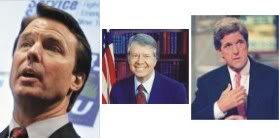

Candidates and supporters who believe we can win the presidency on a wave of apologies should learn the lessons of history.
Cross posted at the Francis L. Holland Blog.
John Edwards said Tuesday that honesty and openness were essential qualities for a president, and that he was proud to acknowledge his 2002 vote authorizing the invasion of Iraq was a mistake . . .
Yahoo.News
But, with John Edwards at 17% in the polls to Hillary Clinton's 43%, the public seems already to be punishing Edwards for his habit of apologizing.
In the September 30, 2004 debate between George W. Bush and John Kerry, the word "mistake" arose 13 times in the context of Iraq, offering Bush ample opportunity to admit that he had made at least one mistake. Kerry admitted to having made significant mistakes while George Bush admitted to none.
BUSH: My opponent says help is on the way, but . . . it's certainly hard to tell it when he voted against the $87-billion supplemental to provide equipment for our troops, and then said he actually did vote for it before he voted against it.
Not what a commander in chief does when you're trying to lead troops.
LEHRER: Senator Kerry, 30 seconds.
KERRY: Well, you know, when I talked about the $87 billion, I made a mistake in how I talk about the war. But the president made a mistake in invading Iraq. Which is worse?
http://www.debates.org/pages/trans2004a.html
The New York Times said,
Until sometime early in the summer, President Bush and his advisers sporadically wrestled with a fundamental choice: Was it smarter to go into the final months of the election campaign confessing to considerable error in decisions leading up to the invasion of Iraq, and in early calculations about how best to occupy the country? Or would the president - "not a man given to backward-looking introspection," as one close aide put it - be better off conceding only the smallest errors of judgment, and focusing the electorate on the hope of a bright future for Iraq and the whole Middle East?Mr. Bush chose the second option. To choose otherwise, one of Mr. Bush's advisers said the other day, would be "to give John Kerry the opening he was waiting for."
But now, in the final 23 days of the campaign, that decision has come to look far riskier than it did in the flush of handing Iraq back to Iraqis. Win or lose, when the history of the 2004 Bush campaign is written, it may turn out that the bet about how to talk about the war will prove pivotal. Mr. Bush held his bet through the presidential debate Friday, declining a questioner's invitation to describe any mistake he had made. http://www.nytimes.com/2004/10/10/weekinreview/10sang.html?ex=1172725200&en=
ac83b971d8fdeb28&ei=5070
But, at the time the talking heads and many Democrats ridiculed Bush for his unwillingness to admit having made mistakes. From CNN:
BORGER: . . . [O]ne of the most interesting things to me, Howie, was sort of the question that the president was asked about, can you ever remember a mistake you made? And this time, unlike the last time he was asked that...
KURTZ: When he was at a press conference.
BORGER: When he was at a press conference, he was a little bit more prepared. And he said, well, if what you mean is did I make a mistake in going into Iraq, the answer is no. Yes, I made a couple of mistakes on presidential appointments, but I'm not going to talk about those now.
And what you see is the Kerry campaign saying, this is a stubborn person who will never admit that he has made a mistake. And that is something they are talking about. http://transcripts.cnn.com/TRANSCRIPTS/0410/10/rs.01.html
And still John Edwards continues today on his National Apology Tour, with the anti-war Left encouraging him and demanding that other candidates joint the John Edwards Lollapalooza Apology Tour. He said recently, ""There's not a single voter in America who doesn't understand that their president is human, and their president will sometimes makes mistakes." Yahoo.News
Other candidates refuse to join Edwards either because the have nothing to apologize for or because they don't believe the Apology Tour is the best way to win the Presidency and end the war. After the Kerry/Bush rout, can you blame them? Are we Democrats trying to win an election or win a place in the Guinness Book of World Records for most apologies on a single issue?
One of the most famous American apologies was Jimmy Carter's 1976 admission that, as concerned adultery, he had "sinned in his heart".
PLAYBOY INTERVIEW: In an interview published in the November 1976 issue of Playboy magazine, then-Governor Carter talked about the role of religion in his life. In one part he said:
"I try not to commit a deliberate sin. I recognize that I'm going to do it anyhow, because I'm human and I'm tempted. And Christ set some almost impossible standards for us. Christ said, 'I tell you that anyone who looks on a woman with lust has in his heart already committed adultery.'
"I've looked on a lot of women with lust. I've committed adultery in my heart many times. This is something that God recognizes I will do--and I have done it--and God forgives me for it."
http://www.pbs.org/newshour/character/glossaries/carter.html
Candidates and supporters who believe we can win the presidency on a wave of apologies should learn the lessons of history. As valid as apologies may be factually, the election usually goes to the candidate who apologizes the least.